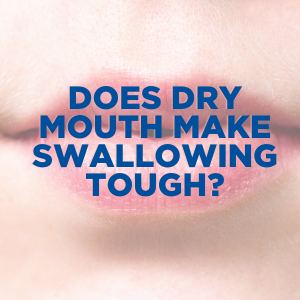Did you now that ectodermal dysplasia can affect the salivary glands? We talk a lot about how it affects sweat glands and mammary glands. But, it can also impact the salivary glands. Dry mouth in ectodermal dysplasia is a common problem for our families and creates lots of challenges.
Ectodermal dysplasia causes the salivary glands to produce a reduced amount of saliva. That hoarse voice many people with hypohidrotic ectodermal dysplasia experience (HED)? A lack of saliva causes that.
In our new library article, “Dry Mouth (Xerostomia) in Ectodermal Dysplasia,” Kay Motil, M.D., PhD. explains the significant role that saliva plays in our health.
Read ArticleSaliva is like a health tonic for your mouth.”
Dr. Motil

She further explains how saliva is instrumental in preventing tooth decay and aiding digestion. It’s especially important for eating and swallowing!
Many of you know this from experience.
Hard to Swallow
Jill Radley, who is affected by HED, said certain foods are more difficult than others to eat because she doesn’t have as much saliva.
“Some foods are really hard to eat. Apples, carrots and hamburger are examples. I can never get them chewed and swallowed. It seems like they grow in my mouth. I drink lots of room temperature water when eating meals. Ice water makes it harder to swallow. It constricts my throat.”
– Jill Radley
Difficulty swallowing and choking are two common issues that adults and children can face. Parents of children with HED share their concerns about their child choking. Children with HED are typically missing many teeth already. Then, with reduced saliva, chewing and swallowing becomes even more difficult.
“I have noticed that my son and I also do a lot of head back swallowing with food and water,” Jill said. “I can’t usually swallow with my head in regular position. I can’t get food back to the throat. I had lots of choking episodes. My food will get stuck in esophagus. Like it is packed. I was told my throat muscles don’t massage food down. (I take) small bites and use lots of liquid.”
Priya Venkataraman is in the process of learning what her baby affected by ectodermal dysplasia can and cannot tolerate when it comes to chewing.
My 9-month-old has both dry mouth and swallowing problems. When she cries even a bit, her voice becomes hoarse and she starts to cough a lot and chokes. She is unable to eat citrus fruits, even in puree form. She chokes and vomits with that. She is only able to take certain veggies in thin puree form mixed with cereal. She chokes/vomits if there is even a tiny bit of solid.
– Priya Venkataraman
Treating Dry Mouth in Ectodermal Dysplasia
According to Dr. Motil, dry mouth due to the lack of adequate saliva in children can be frustrating. In our new library article, she gives 10 tips to help with eating.
“Children should drink, on average, six to eight 8-oz glasses of liquid daily, depending on their age and size. Drink liquids with meals, alternating beverages with food. Tart beverages such as lemonade may help to stimulate saliva production.” – Dr. Motil
Dry foods like bread and rice can be harder to chew and swallow without a lot of liquid.
Svatava Valova said his child affected by ectodermal dysplasia loves bread but finds it tough to eat.
“The problem for our son is also a roll or bread. It seems to me that the older he gets the worse it is, (because of) the fact that he does not have saliva.”
– Svatava Valova
James Finch is an adult affected by HED. He now uses his Cuisinart to help make some foods have more liquid, such as apples for applesauce.
“When I was younger, I just had to be careful and cut my food more or mash on the plate and mainly make sure I chewed my food the best I could before I swallowed. I drank a lot of water or whatever other drink like milk or maybe some juices. I just used a blender when I was younger at times.”
Tips for Dry Mouth
Dr. Motil provides a list of suggestions for the types of foods and drinks to use and avoid plus other tips to help promote moisture in the mouth. Read her full article to learn more.
Dry mouth in ectodermal dysplasia is an ongoing problem from childhood to adulthood. There is no cure for it. But, if you follow Dr. Motil’s suggestions, you or your child can chew and swallow with more ease.
What has worked for your dry mouth? Tell us in the comments below!

I’ve converted to using the Cuisinart for my salads, toppings and sauces also. They’re not blender smoothy with barely any texture if you prefer, I know I still like to chew for exercise and I can make my topping and/or dressing at the same time too.
There was a period when I was traveling on the road I’d even Cuisinart my meat almost always, to make burger that were somewhat meatloaf like burger patties. This helped hydrate the meat also and potentially tenderize more if say I added Pineapple. These burgers included usually onions, garlic, spinach and sometimes oat bran or oat meal among whatever else I wanted to add. Mainly, I was trying to be minimalist and assure all my food was digested thoroughly and completely without being a blender mush and still having some chewing experience. The Cuisinart helped mechanically aid my chewing process and optimize the pre-digestion stage. Plus the agriculture products I used were less processed and I was able to do the processing myself.
Thanks for sharing, James! We’re glad to hear that you found a way to intake nutrients that works for you.
My son does have issues with chewing and swallowing some foods. He also coughs most nights when sleeping. Does anybody have any suggestions to help? We have tried humidifier but doesn’t seem to help. Thanks
Hi, Craig. Yes, many individuals affected by ectodermal dysplasia have a dry mouth because of the lack of salivary glands. We suggest that he eat slowly and drink lots of water when he eats to help him swallow. Also, cut up food into small pieces. You might consult an ENT to discuss way to address his cough. Good luck! ~ Jodi, NFED